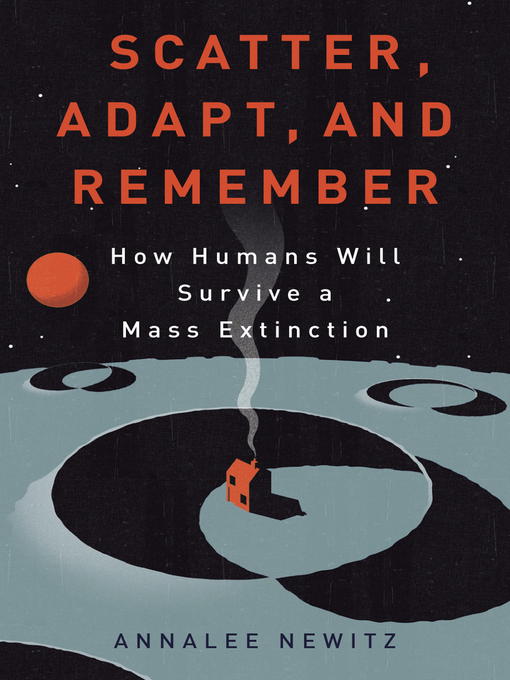
Scatter, Adapt, and Remember
How Humans Will Survive a Mass Extinction
کتاب های مرتبط
- اطلاعات
- نقد و بررسی
- دیدگاه کاربران
نقد و بررسی

May 13, 2013
"Earth has been many different planets with dramatically different climates and ecosystems," says Newitz, journalist and founding editor of io9.com. Finding a common ground between climate change arguments Newitz found a thread of hope while researching mass extinctions: that life has survived at least six such events thus far. Without addressing the cause of the current shift, she cites data that indicates we may already be in the midst of another period of mass extinction. Guiding readers through the science of previous mass extinctions, Newitz summarizes the characteristics that enabled species to survive: variable diet and habitat, and ability to learn from the past. "The urge to survive, not just as individuals but as a society and an ecosystem, is built into us as deeply as greed and cynicism are." She reviews theories of how Homo sapiens survived while Neanderthals did not, discusses how science may one day enable a disaster-proof city, and advocates geoengineering and research for eventual moves to other planets. "We'll strike out into space.... And eventually we'll evolve into beings suited to our new habitats among the stars." Newitz voice is fervent and earnest, and despite her gloomy topic, she leaves readers with hope for a long future.

April 1, 2013
An animated and absorbing account into "how life has survived mass extinctions so far...and what we need to do to make sure humans don't perish in the next one." Massive catastrophes leading to extinctions have already visited Earth at least five times, writes science writer Newitz (co-editor: She's Such a Geek: Women Write About Science, Technology, and Other Nerdy Stuff, 2006), who suggests we must distill all the strategies humans have used in the past and fashion a projection of them into the future--plus a whole new bag of tricks to devise from scratch so as to get by. Humans are the lucky ones, writes the author; we can live almost anywhere and eat nearly anything, and we tell stories, which contain experiences that will help save us. We are also able to wander, like our besieged ancestors fanning out of Africa 70,000 years ago, to fit in elsewhere. Newitz begins with an exceptional tour through the latest thinking on the great extinctions of the past, giving a wide-ranging view of exactly what extinction means. It doesn't necessarily require a decline in numbers but can mean a "depression of speciation," as when an invasive species wipes out all the other species. To the claim that we are headed for the most cataclysmic extinction of all, the author counters that that distinction likely belongs to the Permian period's "Great Dying," 250 million years ago, when more than 95 percent of the species on the planet died. She closes with hope, if not exactly completely convincing optimism: "Things are going to get weird. There may be horrific disasters, and many lives will be lost. But don't worry. As long as we keep exploring, humanity is going to survive." Humans may be experts at destroying the planet, but we are no slouches at preserving it, either, and Newitz's shrewd speculations are heartening.
COPYRIGHT(2013) Kirkus Reviews, ALL RIGHTS RESERVED.

May 15, 2013
Newitz (founding editor, io9.com) presents a speculative work of popular science, posing some possible eventualities in the future history of Homo sapiens living on a planet that has faced numerous extinction-level asteroid impacts. She begins with an overview of past extinction events, e.g., the global ice age, megavolcanoes, that eliminated a majority of species, leaving only a small portion to scatter and adapt. She then looks at human evolution, exploring the theory that Homo sapiens may have dwindled to merely thousands about 100,000 years ago owing to stressful migration and climate change. She moves on to look at how we and other species have used the survival strategies of scattering, adapting, and remembering. As to potential future strategies, Newitz discusses the ways in which scientists are seeking to make cities sustainable. In the last part of the book, she considers leaving for other planets, much as when we left Africa for other environments. She reminds readers that remembering is crucial in order to pass on stories about survival. VERDICT The overall message here is of hope rather than extinction. Recommended for fans of the study of extinction, fanciful evolutionary possibilities, and generally thinking outside the box where these subjects are concerned. Lay readers will find this accessible.--Gloria Maxwell, Metropolitan Community Coll.-Penn Valley, Kansas City, MO
Copyright 2013 Library Journal, LLC Used with permission.

























دیدگاه کاربران